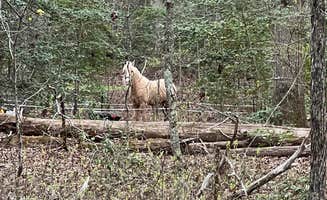Equestrian camping options near College Park, Maryland remain limited, with most parks offering trail riding but few dedicated horse camping facilities. The area sits within the Chesapeake Bay watershed at elevations between 50-300 feet, creating varied terrain for riders. Summer temperatures typically range from 75-90°F with high humidity, while spring and fall provide more moderate conditions for both horses and riders.
What to do
Trail riding at Cedarville State Forest: The forest maintains dedicated equestrian trails through wooded areas with relatively flat terrain. Visitors can encounter riders throughout the trail system, particularly on weekends. "There are some abandon camp loops around the open campground which makes for some cool walks with your dog. Very pretty area with lots of trails and overgrown roads to walk. Equestrian trails go deep into the woods if you want a longer trail," notes Ben J. at Cedarville State Forest.
Disc golf near campgrounds: Several parks offer disc golf courses for campers seeking alternative activities. "I'd recommend taking in a game of disc golf on their 18 hole course," suggests Rachel L. at Pohick Bay Regional Park. This activity provides a good option for equestrians during non-riding days.
History exploration: The region offers significant historical sites near camping areas. "Lots of history near by so check out the old battle fields and buildings that housed troops during civil war. Very cool stuff," mentions Daniel S. at Bull Run Regional Park. These sites often have parking areas suitable for horse trailers during day visits.
What campers like
Proximity to Washington DC: Many campgrounds serve as convenient bases for exploring the capital while still having access to riding areas. "Pohick Bay is my go-to weekend camping spot. Just a few miles outside DC, Pohick Bay is a hidden gem in the area," shares Rachel L.. This allows equestrians to combine urban and rural experiences.
Clean facilities: Campers consistently mention bathroom and shower quality at area campgrounds. "Bathrooms are clean and showers are warm. Water is readily available," notes Bill G. about Cedarville State Forest. This practical consideration matters for longer horse camping stays.
Wildlife viewing: The natural areas around College Park provide opportunities to observe local fauna. "Saw a snake, alligator snapping turtle, and rabbits, before we even reached the gates," reports Ben J. at Cedarville State Forest. Similarly, at Pohick Bay Regional Park, Kathie M. notes "Eagles everywhere! Large clean sites."
What you should know
Tick prevention is essential: Multiple reviews mention tick problems, especially relevant for equestrians spending time in wooded areas. "I got one, but my wife and dog got about a dozen each. Just bring tweezers," warns Ben J. about Cedarville State Forest. Another camper notes: "Lots of trails but in June at least the ticks were waaaay too plentiful."
Limited trailer parking: Most campgrounds near College Park have restricted space for large vehicles including horse trailers. Sites often have physical constraints making horse trailer maneuverability challenging. "Site 6 was good but not for larger rigs. We have a pop up and had to navigate around a tree that would have been very difficult for larger rigs," explains Nurse N. at Cedarville State Forest.
Noise considerations: Several parks experience noise from nearby infrastructure. "It's close to a Naval base, and therefore you constantly hear airplanes, and helicopters at all times," reports Kasey M. about Cedarville State Forest. Similarly, at Bull Run: "Downfall there's a shooting range near by so can be kind of noisy."
Tips for camping with families
Water activities for non-riders: Family members not participating in equestrian activities have other options. "This is definitely a family campground. So my activities for kids and places to run around. Pirate's Cove waterpark is definitely a highlight in summer. Boating in summer from kayaks to motorboats," recommends Anne K. at Pohick Bay.
Structured activities: Some parks organize regular events for children. "They had a scavenger hunt for the kids going all weekend, they had an outdoor movie scheduled for Friday night, a campfire story time scheduled for Saturday night and crafts scheduled for Sunday morning," explains Ben G. at Pohick Bay Regional Park.
Playground access: Consider proximity to play areas when selecting sites. "Our site was spacious. We are tent campers but almost all our neighbors were in an RV or trailer. The site had water and electric which was nice. The bathhouse is standard but also has laundry and an outdoor dish washing station," reports Ben G.
Tips from RVers
Site leveling challenges: Many campgrounds require additional equipment for leveling. "My site had a slight slope, but was easily overcome using additional blocks on the low side to get the trailer level," notes Drew M. at Bull Run Regional Park. This is particularly important for horse trailer combinations.
Water management: Some campgrounds have drainage issues during rainy periods. "While we were here, there was a fairly heavy day of rain. Couple inches, I suppose, but nothing Biblical. The mouths of the metal culverts in our loop were bent downward from campers driving over them, which obstructed the flow," shares Stuart O. at Bull Run Regional Park.
Site selection for larger vehicles: When making reservations at potential horse campgrounds near College Park, Maryland, request specific information about site dimensions. "The sites are all pull-through off the roads through the campground. So your camper faces the woods and you feel like you're all alone," explains Roberta K. about Bull Run Regional Park.


